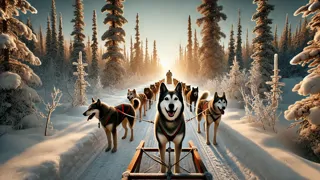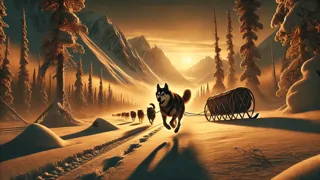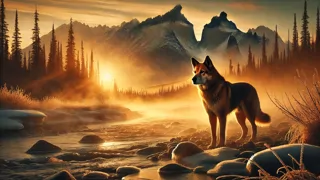Introduction
In the heart of Santa Clara Valley, golden sunlight draped the sprawling Miller estate in warmth and ease, where Buck, a powerful St. Bernard–Scotch shepherd mix, knew nothing but comfort. Every morning, he felt the dew on emerald grass beneath his paws, the murmur of blossoms in the orchard, and the lazy hum of bees dancing around apple and plum trees. Spoiled by Judge Miller’s family and pampered by gentle hands, Buck’s life was free from hunger, cold, or fear. He learned the sound of his own name and the clink of his silver bowl as his signals for breakfast, then dozed by the hearth as children laughed in sunlit hallways. But none of this ease prepared him for the shattering turn of events that would carry him north, far beyond any fence or orchard, into a realm where the air burned sharp, the nights shivered in endless cold, and the rhythm of life belonged to ice and snow. When the stranger’s rope snapped tight around his neck, when he was thrust into unfamiliar paws and clattering sled-driven teams, Buck sensed a profound change. The scent of gold-hungry men, the crack of whips, and the howl of distant wolves beckoned something deeper within his bones—a call that would crack his carefree world and forge him anew amid the frozen expanse of the Klondike Gold Rush.
From Estate to Ice: Buck’s First Steps
Under the brilliant heat of his Californian home, Buck had known the taste of fresh cream, the warmth of tiled hearths, and the gentle murmur of laughter drifting through glass windows. He lived within white picket walls, where orchard blooms scented the afternoon breeze, and his paws pressed velvet grass as carefree as any pauper’s dream. Yet that life dissolved in an instant—one moment, he was lazing by the veranda among polished mahogany chairs; the next, he was yanked into a rough rope and thrust into a hard world he had never imagined.

The journey north began with rattling wagons that trundled through pine-lined roads, drawing closer to the sea’s salty breath. In the port of Seattle, Buck felt the clamor of crates, the hiss of steam engines, and the shouts of working men intoxicated by rumors of wealth. He was loaded aboard a creaking coastal steamer, where cold winds lashed his golden fur and deck planks groaned beneath frozen boots. Nights swayed with the sway of the ship, while salt spray stung his eyes and thunder threatened on distant horizons. Each unforgiving mile beckoned the unknown, until at last he stepped onto wooden docks shining with winter’s frost in Skagway, Alaska.
Neither kennel nor hearth awaited Buck there. Instead, he met the bark of his new masters—Perrault, swift and wiry, and Francois, solid and subdued—who slapped harness straps over his shoulders and spoke in clipped French and English that carried no trace of comfort. The harness pinched unfamiliar places, leather chafed his underbelly, and the whip cracked sharp as ice shards. Still, he felt the first flicker of something electric—an awakening traced to his earliest ancestors—coursing through his veins. The once-comforted dog began to stand taller, sniff more deeply, and drink in lessons hard-won by trial. Each sunrise blazed across a new frontier, and with every mile of packed snow, Buck’s heart beat with the call of a world entirely wild.
Trial by Ice and Teamwork
The sled line glided over rivers locked by frost and climbed mountains laced with treacherous ice. Buck, repositioned behind the lead dog, learned to find rhythm in the stamping of partnered paws, to heed the musher’s call amid wind-blown whiteouts, and to trust the dog at his side. Cold cut through every bone; nights plunged into silence broken only by the crackle of wood fires and the jangle of harness buckles as teams pressed on. Each time the whip cracked overhead, Buck felt a pulse of fear, but also something fiercer—a courage forged in steel and snow.

Hungry days gnawed at his belly until he discovered grit within himself. He stole scraps from open packs, lunged for meat before frost could claim it, and broke the ice on shallow streams with fists of his paws to drink. The luxury of bowls brimming with cream had vanished. Now he tasted freedom in every gulp of nameless water and found purpose in every trail marker that vanished behind. He rose before dawn, his breath pale mist in the dim glow of lantern light, and he ran until his muscles burned and his heart pounded like drums in ceremony to the land’s fierce beauty.
Through bitter blizzards and treacherous river crossings, Buck and his team endured the musher’s commands, learning to pivot through icy gulches and accelerate down frozen inclines. He felt the pack’s bond tighten around him, a silent code written in paw prints and teamwork. When the musher commanded “Mush!”, the sled surged forward like a living thing. When he hissed “Whoa!”, the dogs slid to an assured stop on hidden ice ledges. Under the ghostly glow of a partial moon, Buck often paused to listen to the haunting cry of wolves in the distance, feeling his heart stretch toward that untamed choir and recognizing that his life had changed forever.
Embracing the Call of the Wild
Months passed in a blur of ice-crusted harnesses and sky-piercing northern lights. The call within Buck grew louder—the distant howls, the still calm of untouched wilderness, the fierce promise of mastery over a land untamed by men. He discovered joy in the snap of ice under his paws, and a solemn reverence for the silent majesty of mountain silhouettes emerging at dawn. He no longer belonged wholly to the world of hearth and home; he had outgrown it as surely as a pup outgrows a worn collar.

One frigid evening, when the northern wind roared like an ancient spirit, Buck broke free of the team. His heart hammered as he sprinted across the blank canvas of snow, guided by instincts older than any man. He tasted the wind, felt the ground’s rhythm, and raised his muzzle to greet the stars with a howl that trembled through frozen canyons. In that moment, he shed the last tether of civilization. The boyish dog from California was gone, replaced by a leader born of the wild, fierce and free.
When morning light finally streaked across the horizon, Buck returned to his pack—but nothing was the same. He bore the calm confidence of a wolf; his coat bristled with the lineage of hunters. The other dogs gathered behind him, and the musher’s sharp commands felt distant, echoes of a past life. Buck understood now that survival meant more than endurance—it meant embracing what lay within. The call of the wild was no mere whisper; it was the song of his true nature. With a single turn of his head, he led the team forward, wind in his fur, eyes bright with the promise of endless trail beyond the reach of men’s gold.
Conclusion
Buck’s journey from a pampered pet on a Californian estate to the undisputed leader of a sled team in the Yukon stands as a testament to the power of instinct and adaptation. In the vast, unforgiving sweep of the Klondike Gold Rush, he discovered that true wealth lay not in the glint of stolen gold, but in the raw freedom of the wild world around him. His heart, once tethered to sofas and cream bowls, now beat in time with the wind-whipped landscape, echoing the ancient call of ancestors who ran beneath star-studded skies. Each mile of packed ice taught him self-reliance; every crack of the whip and howl of wolves shaped him into something stronger, fiercer—and nobler. As he led his team across frozen rivers and spanned mountain passes, Buck embodied the enduring spirit of survival, showing that courage and perseverance can lift any creature from comfort into greatness. In his final howl to the horizon, he celebrated not only his own transformation but the timeless bond between creature and wilderness that no man can truly command.


















